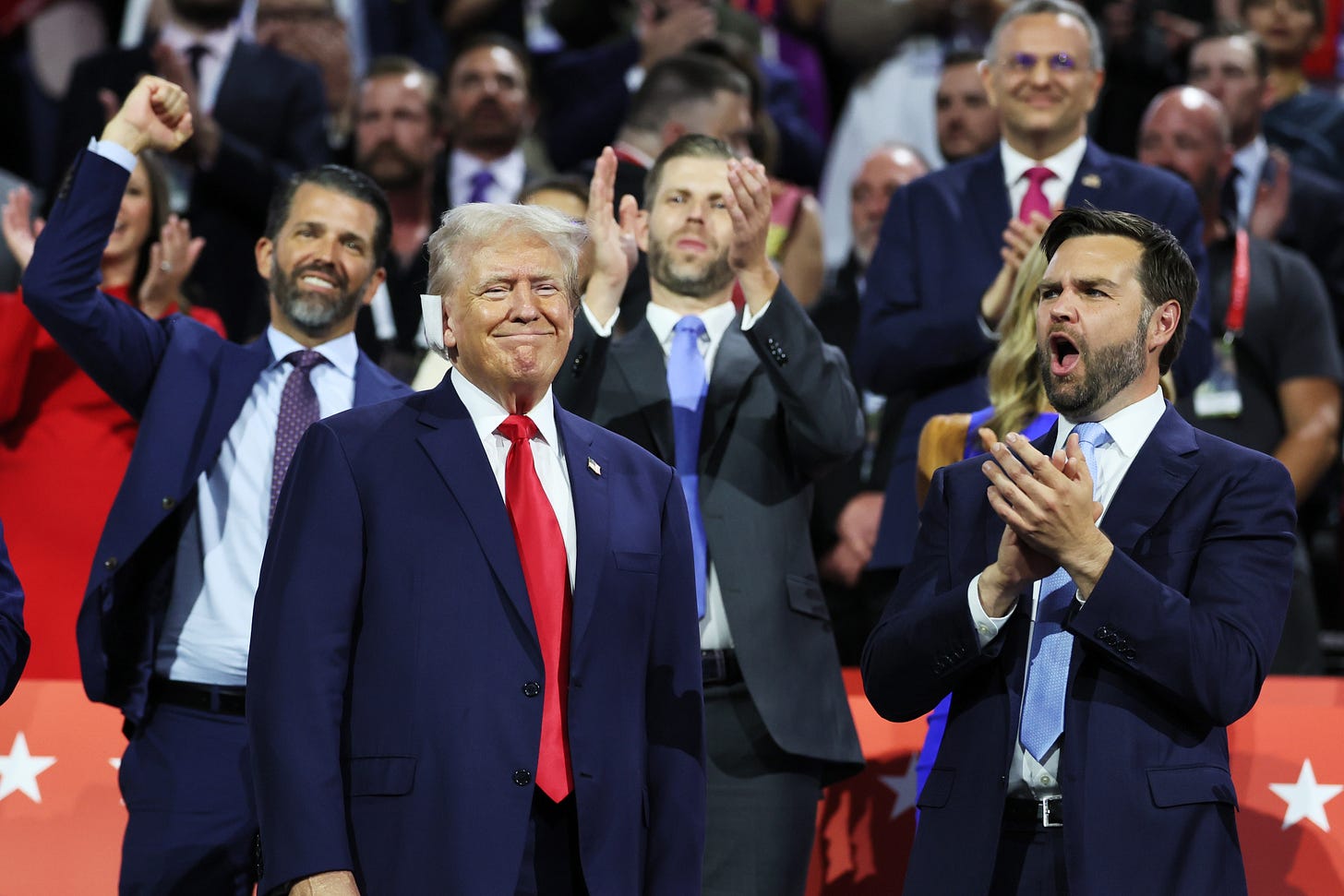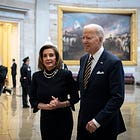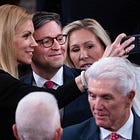The phony populism of JD Vance
It's a cynical branding exercise.
This free edition of Public Notice is made possible by paid subscribers. If you aren’t one already, please sign up to support our independent journalism.
Trump chose JD Vance as his running mate this week, and a certain segment of the news media immediately rushed to declare the start of a new kind of working-class Republicanism.
“JD Vance pick unnerves GOP’s business elite, thrills populists,” Jeff Stein declared in the Washington Post. “In JD Vance, Trump is going all in on populism,” Politico affirmed, adding that Vance was “someone who could help [Trump] attract blue collar and Rust Belt voters.”
So what is it about Vance that has led these outlets to frame him as a muscular, billionaire-frightening populist? Is Vance fighting to restore the expanded child tax credit, which slashed childhood poverty before it expired? Does he want to repeal so-called right-to-work laws in order to empower labor?
Hah. No, of course not. Vance’s populism is a shallow, cynical branding exercise. Like his Republican brethren, and like Trump, his populism is paper thin; he views the working class with contempt and embraces policies that would entrench poverty and gut social mobility.
Vance has benefited throughout his career from the gullibility of the mainstream media, which never tires in its search for a white working-class whisperer. Vance, a venture capitalist, stopped being anything like working class long ago, and no one should be fooled by his transparent phoniness.
Hillbilly Elegy
Vance initially positioned himself as working-class whisperer with his 2016 memoir, “Hillbilly Elegy: A Memoir of a Family and a Culture in Crisis.” The book chronicles Vance’s journey from dysfunctional Appalachian-immigrant Ohio Rust Belt family to Yale Law superstar. Vance argued that he managed his success by shaking off a white working-class culture of laziness, addiction, and failure.
You may think that sounds unsympathetic to the plight of working-class people. And you’d be right. Vance pretends to care about the working class of Appalachia, but his tone is one of vindictive condescension.
In discussing the issues facing working-class people, Vance doesn’t dwell on deindustrialization and decades of anti-labor policy, nor on the bipartisan assault on welfare and the safety net of the 1990s and 2000s, nor on the devastation of the 2008-2009 financial crisis. He blames entrenched poverty not on the wealthy and powerful, but on the poor and powerless.
A note from Aaron: Working with brilliant contributors like Noah requires resources. If you aren’t already a paid subscriber, please support PN by becoming one.
“We spend our way into the poorhouse,” he insists. “We buy giant TVs and iPads. Our children wear nice clothes thanks to high-interest credit cards and payday loans. We purchase homes we don't need, refinance them for more spending money, and declare bankruptcy, often leaving them full of garbage in our wake.”
And so on. Vance thinks the poor could just stop being poor by making different spending choices. But as journalist Linda Tirado points out, in her personal experience of poverty, she often found saving to be pointless. The hole was too great to crawl out of, so the logical thing to do was to buy things that made you happy when you had a bit of extra cash and worry about the future later, if at all.
“We have learned not to try too hard to be middle class. It never works out well and always makes you feel worse for having tried and failed yet again,” Tirado writes. “Better not to try. It makes more sense to get food that you know will be palatable and cheap and that keeps well. Junk food is a pleasure that we are allowed to have; why would we give that up?”
Punching down
One of Vance’s most unintentionally telling anecdotes occurs early in the book. Vance describes a summer when he was 26 and looking for a job to help him move to New Haven for Yale Law. He got a job hauling floor tile at $13 an hour. One of his coworkers was a 19-year-old named Bob whose girlfriend was pregnant. Bob, per Vance, was a lousy worker. He took multiple extended bathroom breaks a day.
Vance doesn’t acknowledge at any point that $13/hour to haul around heavy floor tile is a pretty lousy wage. On the contrary, he expresses wonderment that the factory had trouble filling positions given the generous pay. Nor does Vance acknowledge any potential differences between a college grad with Yale Law ahead of him and a 19-year-old looking at a grinding existence of hauling tile until his back gives out. Instead, Vance simply asserts, “You can’t ignore stories like this [about Bob] when you talk about equal opportunity,” as if one kid who doesn’t want to drag around floor tile for $13/hour is a key sign of cultural decline and failure.
Already in his supposedly thoughtful, compassionate memoir, Vance was telling right-wing ghouls and wealthy bosses what they wanted to hear. If people don’t take a shitty job, it’s because they lack character, not because owners aren’t paying enough. If people are trapped in generational poverty, it’s because they’re broken and immoral, not because unions and the social safety net have been gutted.
“[T]hese problems of family, faith, and culture aren’t like a Rubik’s Cube, and I don’t think that solutions (as most understand the term) really exist,” Vance mused. No policy can save all those lazy Bobs. Real populists don’t help the working class; they sneer at them.
Populism as a political cudgel
When he wasn’t memoir-ing, Vance was a finance guy, establishing venture capital funds backed by right-wing billionaire oligarchs like Peter Thiel and Marc Andreessen. Those connections proved very helpful during Vance’s Senate bid in 2022, when Thiel donated more than $15 million to his campaign.
As you’d expect, Thiel is not interested in supporting candidates who advocate for massive wealth distribution or who consistently challenge oligarchs. When your populism appeals to Peter Thiel, it’s not really populism.
Vance for example has talked about raising taxes — but not on the wealthy. Instead, he wants to dramatically increase taxes on university endowments. He’s said he’s interested in breaking up some companies like Google — but not because he opposes the concentration of corporate power. Rather, he wants to punish Google for supposedly being too friendly to progressives. Vance told Fox Business that Google “actively solicits and forces left-wing bias down the throats of the American nation.”
Similarly, Vance claimed to support the UAW strike against the big-four automakers, and said that “auto workers have gotten the short end of the stick.” But, as Kate Aronoff points out at The New Republic, Vance all but tied himself in knots to avoid criticizing the automakers. Instead, he blamed the workers’ woes on Democratic subsidies for green energy — even though many of those subsidies will go to the automakers themselves for electric vehicles.
Anti-anti-Putinism
You may be noticing a pattern. Vance’s “populism” isn’t about helping the poor or reigning in the rich. Instead, he targets “elites.” That means Democrats, marginalized people, and whoever Vance considers a political enemy: green energy companies, universities, tech companies that aren’t enthusiastically and uniformly pro-fascist. Vance isn’t focused on making life better for the poor. He’s focused on using the power of the state to harm political opponents.
You see the same dynamic in what has perhaps been Vance’s signature issue: opposition to aid to Ukraine. Vance claims that sending funds to Ukraine is wasteful, and that we could be using the money at home to close the border.

And why do we need to close the border? Well, according to Vance we need to do so because otherwise we’ll have “more illegal drugs and more Democrat voters pouring into this country,” per one of his 2022 ads.
Vance’s populism here is just rabid partisanship. He’s dipping a toe (or more than a toe) in vile far right antisemitic Great Replacement conspiracy theories which claim that nefarious “elites” are allowing immigrants into the US in order to challenge white hegemony. There’s barely a pretense on Vance’s part that he’s trying to help the working-class. He out and out says his goal is to “protect” Republicans from the voting power of immigrants — who might cast ballots for Democrats to, god forbid, expand the social safety net.
The Trump/Vance administration will be bad for workers
Vance has made some slightly more convincing populist noises at various points. He worked with Elizabeth Warren on legislation to punish bank CEOs when their institutions fail. He backed a Republican bill to raise the minimum wage (which was larded down with immigration provisions which assured it would go nowhere).
But such half-hearted support for working people is more than drowned out by what may be Vance’s most anti-working class move yet: agreeing to be Donald Trump’s running mate.
Trump likes to cosplay as a populist too. But his policy preference for oligarchs is even less hidden than Vance’s. Economists believe that Trump’s economic program of tax cuts for the wealthy and massive tariff hikes would cost the average American household $1,700 a year. Trump’s record in office was rabidly anti-union; his NLRB board gave corporations great latitude to preserve anti-union campaigns, and his Supreme Court appointees kneecapped public sector unions by making it harder for them to collect dues.
And of course Trump has promised to continue to try to repeal the ACA. His big populist dream is to rob people of health care so that working and middle class people can mount up more medical debt and bankruptcies when they don’t just conveniently die of treatable illnesses.
Vance has joined a Trump ticket dedicated to funneling money to oligarchs and crushing workers; his populist policies are a thinly veiled excuse to attack his political enemies; his memoir is an extended rant about his contempt for poor people. If populism means support for the working class, that’s not Vance. If populism means policies to help the poor, that’s not Vance either.
And if populism means fomenting hatred against marginalized people, including the poor? Well, yes, if that’s the definition you’re using, that sounds a bit more like the new Republican vice presidential candidate.
That’s it for today
We’ll be back with more tomorrow. If you appreciate this post, please support Public Notice by signing up. Paid subscribers make this newsletter possible.
Thanks for reading.







Your fellow journalist on this platform, Jessica Valenti, wrote yesterday about the nyt deceptively editing a quote from Vance to make it sound like doesn’t support a national abortion ban when he absolutely does. He said rape victims shouldn’t be allowed abortion care bc 2 wrongs don’t make a right. As much as I’d love for you to interview Jessica Valenti for the newsletter, I’d love even more if you dove into how misogynistic he is & how much the policies he supports, national abortion ban or getting rid of no fault divorce, will hurt women.
Nice laying out the logic behind the tragic.
Thank you.
A neighbor offered that Trump always picks vice presidents with one syllable last names.
Not to be upstaged.